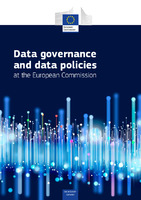| dc.description.abstract | The Juncker Commission put great emphasis on improving policymaking and internal processes by making it easier to access
internal and external data, and extract insights from these data with advanced digital technologies. The Commission's data
strategy constitutes a corporate commitment to transform the Commission into a data-driven organisation, enabled by a
data ecosystem governed by corporate data governance and data policies. President von der Leyen’s ‘political guidelines’ ( 1)
set out a vision of a Commission that leads by example and is fully digital, agile, flexible and transparent, and emphasise the
‘need to share’ data, considering data protection, information security and intellectual property.
To ensure that the Commission can build on the available data and information as effectively and efficiently as possible when
developing its policies, it must invest in data governance and data policies today. To implement the von der Leyen Commission's
‘whole of government approach’, obstacles to internally sharing, combining and reusing data assets will need to be removed,
where and when possible. The ‘need to share’ principle should become the norm for sharing data, information and knowledge in
the organisation.
This is a ‘living’ document. Its purpose is: (i) to show how data governance and data policies can allow the Commission to
transform into a data-driven organisation; (ii) to provide direction; and (iii) to identify areas for further work. It is the result of
joint work between the Secretariat-General and the local data correspondents network. It is informed by and consolidates
existing local initiatives under a common corporate framework, and is aligned with international standards and good practices
in the field.
Trusted and reliable analytics and artificial intelligence — which are key ingredients for transparent, evidence based policy-
making— require findable, accessible, interoperable, secure and high-quality data.
Data governance and data policies help the Commission comply with regulatory and legal requirements, notably those linked
to data and document management, access to data and documents (including open data), data protection, intellectual prop-
erty and information security, thereby reducing associated risks. They deliver medium to long-term efficiencies in resources
spent on data management, due to the optimisation of data creation, collection, acquisition, access, use, processing, sharing,
preservation and deletion, and to better data quality.
Data governance sets out a framework with clear roles, and the responsibilities and interdependencies of those roles.
Data policies introduce common principles, guidance and working practices in the areas of data management, data interop-
erability and standards, and data quality. Equally important are the areas of data protection, information security and intel-
lectual property. However, these are not the focus of this document. Corporate data policies do not specify detailed processes.
This allows Directorates-General (DGs)/services to organise themselves in the way that best suits their internal organisation,
while ensuring coordination and alignment across the Commission, including its executive agencies. |

